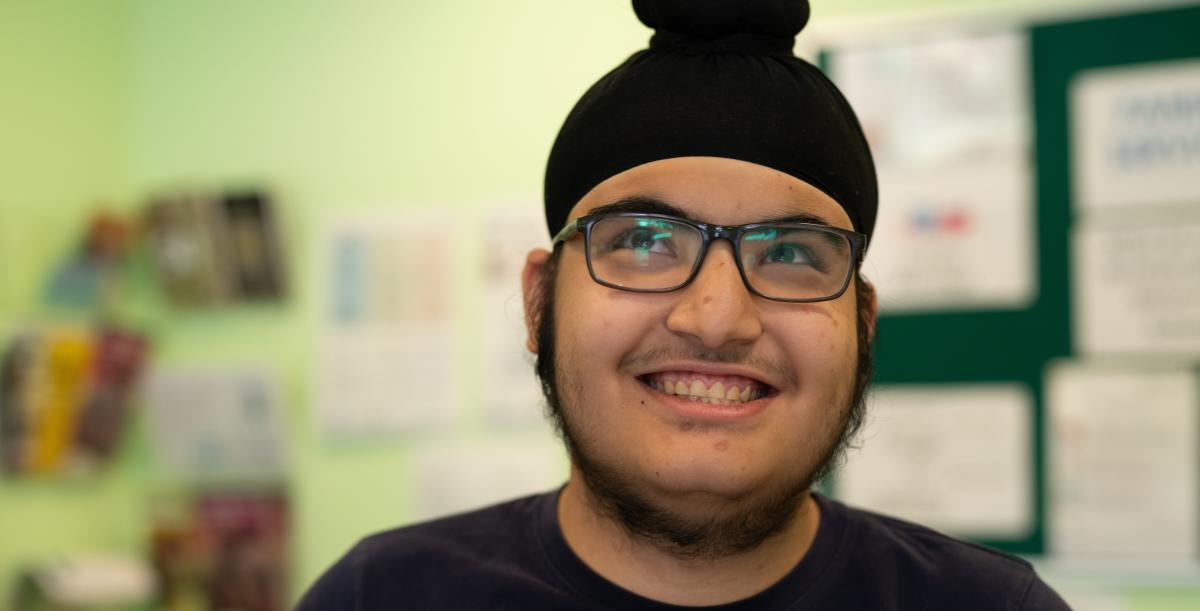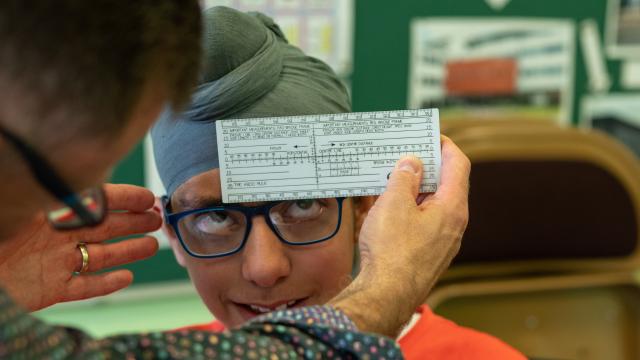
Special schools eye care: let’s make sure this showstopper service has all the right ingredients
As the NHS engagement closes on what a new national special schools eye care service programme might look like, our Chief Executive Lisa Hopkins blogs on how vital it is this service provides children, parents and schools with the best care possible, with a link to our response.
Lisa says:
“This is a blog for anyone who cares about eye care for children with learning disabilities, with an added spin for anyone (like me) who enjoys the Great British Bake Off.
At SeeAbility we been working on the case for a special schools eye care service and its delivery for over a decade, just as long as this much loved TV show.
We started out with a beautiful vision of what the service could look like – just as the bakers do at the start of their bake. But the process wasn’t all a piece of cake by any means, as many readers will know!
Half of children in special schools have a sight problem but over half are missing out on the eye care they need. This injustice severely affects their education and life chances.
With experts, we all agreed that what is needed is as much of a ‘one stop shop’ of eye care to children with learning disabilities within school, with familiar teams who have a relationship with the children, parents and teachers, and a way of supporting children so they are not rushed, their needs are understood and crucially they wear the glasses that they need. We completed the largest global study on the needs of this population.
This year we had the fantastic news that Government and NHS England agree the proof of concept service is a recipe for success. It was for us our ‘Hollywood handshake moment’. However, reality bites, as now everyone agrees why the service is needed, it is how it is delivered across the nation that will be key.
We have just responded to NHS England on its proposals and I know many others who care about children with learning disabilities have too.
Baking in quality of care
In our response we have reflected on the independent evaluation, finding only nominal changes are needed following the fantastic feedback from parents, schools and clinicians.
So we are urging NHS England not to take away vital ingredients, such as mandated requirements on training, specialist dispensing and equipment as, without these, it could lead to more inconsistent, poorer quality and incomplete care.
For these children, who have so many other support needs, and often complex vision issues, this could be a recipe for disaster, missing out on elements of care that they need or resulting in many children having to be seen in hospital eye services, which are already inundated.
One key ingredient is the way the service removed many barriers to the children getting the glasses they need – a major outcome of the service is finding that 42% of children need glasses to see and, in many cases, if children miss out on glasses their vision won’t develop properly. Complex lenses and robust frames are hard to come by for parents and were free of charge, along with spare pairs, but worryingly this support could be withdrawn.
Baking in expertise and safeguards
At SeeAbility we already deliver this service in 27 special schools across London, seeing thousands of children. It really is our bread and butter work, alongside social care and our other programmes of eye care for people with learning disabilities; we have an ambition to do much more and reach more schools.
Along with many existing providers of these services in special schools, we collectively have the experience and knowledge on how crucially important it is to maintain the quality, familiarity, and consistency of support for the children we see.
 Importantly, the model was a move towards recognising the need to properly fund clinical time in community optical care. Other areas of the UK are trying to do this more comprehensively, but access to community eye care in England is patchy, and still relies on high street opticians having to ‘upsell’ to survive. The proof of concept model avoided this element of retail for this special cohort of children.
Importantly, the model was a move towards recognising the need to properly fund clinical time in community optical care. Other areas of the UK are trying to do this more comprehensively, but access to community eye care in England is patchy, and still relies on high street opticians having to ‘upsell’ to survive. The proof of concept model avoided this element of retail for this special cohort of children.
We still have no clarity on how the service will be funded, but we are very clear this does need to specified at a national level, with all the assurances and continuing safeguards needed to allow for clinically excellent services to continue to be financially viable, so parents and schools get access to this scheme and the best care from a range of providers.
The service still has the potential to be a showstopper – transforming lives and saving sight – so let’s help the NHS get the key ingredients right!
Look out for further guest blogs in the coming days


